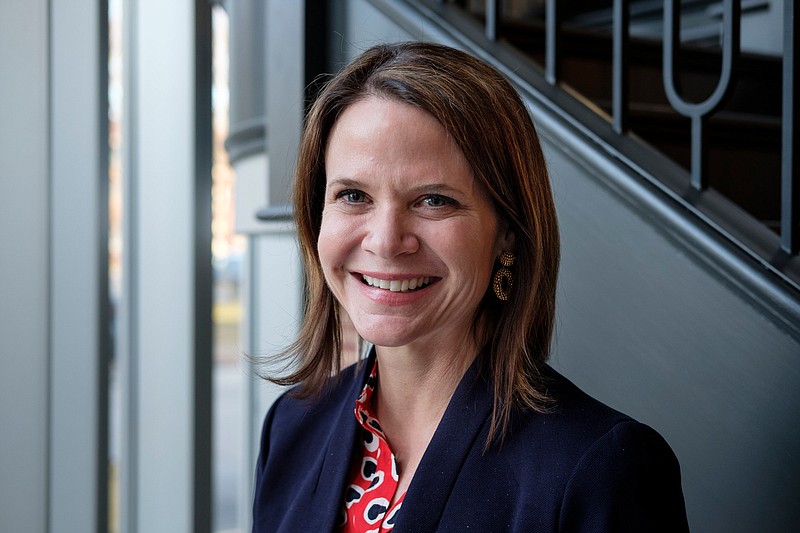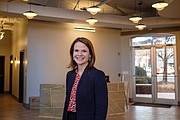The Community Foundation of Greater Chattanooga has long been the forgotten younger sibling among the city's nationally known philanthropic heavyweights, despite a sizable coffer and donor base.
Some might know that the Lyndhurst Foundation helped jump-start the downtown renaissance and supports conservation across the South. And some know that the Benwood Foundation has worked very intently and publicly to address public school performance. The Maclellan Foundation is well known for its support of Christian missions around the globe.
The Community Foundation's work, however, was always less known and less understood. That is, until recently.
Over the last few years, the foundation - which has worked for more than two decades, quietly, to acknowledge and address Chattanooga's race- and income-based disparities, before terms such as "equity" and "economic mobility" entered the lexicon - has shaken up the local donor world by seeking to win, not just donors' dollars, but also their hearts and minds.
"An African-American woman, who has the same education as someone from the majority, her pregnancy process and outcomes, even though she is educated at the same level and at the same income, she may still have a harder birthing process. Everything else is equal. Well, everything else isn't equal. That's the groundwater," said Greg Willett, an attorney at Chambliss Law, who as a Community Foundation board member, has participated in one of the foundation's recent trainings on racial equity. "There are a lot of preconceptions, myself included, and I am trying to get beyond that. There is a problem. I can't say there isn't a problem. There are ways to solve this, and the solution might come from a place I didn't think it would."
Pete Cooper, a former banker and the foundation's head for 25 years until his retirement in 2015, had an ear-to-the-ground approach to matching donors with community needs. He didn't believe in silver bullets, he often said. Racism was too real. Classicism was too real. They were the complicating forces that complicated ivory-tower ideas, which so often seemed well thought out but often proved impotent after data was assessed.
He was a ferocious supporter of Metropolitan Ministries - still one of the only places in the city where struggling families on the brink of homelessness can go for financial assistance - when offering direct financial assistance to the poor fell out of vogue in giving circles. He hired Rebecca Suttles to enhance the foundation's college scholarship program, which focused on first generation and/or low-income college bound students. Then he used the success of the program she built to educate about the role relationships and social capital played in moving the needle on poverty, before "social capital," too, became a buzz word.
So when Maeghan Jones, former head of the Chattanooga Area Food Bank who worked in private philanthropy in Denver before becoming an attorney, was selected to run the operation after Cooper's retirement, the foundation's informal values began becoming much more formalized.
"Pete was ahead of his time. From a personal perspective, he lived it daily. There was always equity work but we didn't call it that," said Suttles, who continues to run the foundation's scholarship program. "I am very proud of the work we are trying to do. I think we have always had the will to do things, make changes. Now we have taken that deep. We are talking about roots, and some of those roots are rotten."
In the past, some potential donors chose not to park their funds at the Community Foundation because they wanted their own trusted financial advisers to maintain control. By researching other community foundations, Jones found a legal maneuver that allows fund- holders to retain their wealth advisers, and two years later, the foundation now has an additional $17 million in investments overseen by local managers.
"There is a sense of the organization growing and evolving with the times," said Dana Perry, an attorney who does estate planning at Chambliss Law. "They are eager, the foundation is, to work with financial advisers. If a client has charitable intent there are structures that can be put into place, special types of funds."
Since Jones took the mantle, the foundation's assets have grown from $110 million at the beginning of 2016 to $149 million overall, and in 2018 alone the foundation gave $20 million in grants. Though Jones admits it might sound saccharine, this growth, she believes, is the product of love.
"Relationships are at the heart of our work and our growth. We recognize that if you want to make real change in the world, then you have to start by understanding what matters most to people," said Jones. "Giving is a way to be part of something that is greater than any one person. It goes beyond charity, it is about love, and shaping the future and creating a more fair and compassionate community."
All this means donors and their families are being engaged in new ways. Before they decide how they want their donation spent, the family meets with foundation staff for an intensive and intentional conversation about what values they hold and where community needs really lie.
"As I learned, I realized the need. You know the visible nonprofits that have a name and brand. My wife and I were both activated by how we could identify fledgling nonprofits," said Barry Large, a foundation donor and partner at the Lamp Post Group. "Equity, and some of these terms, are political footballs, but I don't understand how one cannot see that anything we can do to create equality of opportunity is a good things for society."
Donna McConnico, CEO of Signal Centers, said her organization and two other nonprofits faced a transportation crisis not long ago, which was resolved by the aggressive bridge-building in which the foundation is now engaged. More than 150 families would have been affected, but she said Jones called within the hour and began working to gather potential funders, transportation providers and the affected nonprofits to discuss solutions.
"That kind of leadership makes Chattanooga stronger," McConnico said.
Jones has pushed to grow and diversify both the staff and the board. Tina Curtis, who came to the foundation in November from Suntrust Bank, is now director of giving strategies. At the end of February, Dwayne Marshall, who has been working at the Southeast Council on Foundations in Atlanta, will fill a new position: vice president of community investment. Marshall will oversee the foundation's grant-making strategy and education work.
The foundation is also uprooting from its longtime headquarters on Market Street and moving into a new building on Williams Street, which it will own. Their new building will house meeting space for students seeking scholarships, nonprofits and donors. Local sculptor Isaac Dunkin was selected by Sankofa, an African-American giving circle focusing on the arts and civic engagement and is under the umbrella of the Community Foundation, to help create a new space that feels welcoming and inspiring, Jones said.
The makeup of the foundation's grant-making committee has changed with the addition of community representatives who offer an on-the-ground perspective that has been a boon to small nonprofits and upstart ideas often overlooked, such as The Net Resource Foundation, which works to mentor and build community in Alton Park.
"They have been encouraging, supportive, and guided us to resources that will help us with long term sustainability," said Raquetta Dotley, program director at The Net Resource Foundation. "Last year, they restructured their grant process and that was the much-needed resource that a small organization like ours needed to help build capacity. Their grant process was very user-friendly and provided the needed feedback to strengthen our proposal, which in turn can be used for other grants we may be applying for."
Jones said the foundation's board and staff see economic mobility as a top priority, and addressing racial inequities will be crucial to that work. Foundations and nonprofits all across the country, as well as in Chattanooga, have also identified those issues as paramount if cities are going to grow and thrive. Even the Chattanooga Area Chamber of Commerce named those issues as challenges for the region in a recent study.
Jones said she is also serious about listening to those who have long been affected by poverty and a lack of opportunity.
"One of the joys and challenges of our work is that we know we don't have all the answers," she said. "At the foundation, we are pushing ourselves to get closer to the challenges we want to address and to engage those closest to the problems in creating the solutions. Those closest to the problems hold meaningful insights. We need to put resources in their hands and invest in their leadership and wisdom."
Donors keep coming back and asking questions, said Suttles, who is also a Benwood Foundation board member. They seem troubled by what they have learned. There was so much they didn't know, they tell her. Having been to so many touchy-feely meetings over the years that never had that effect, she said she is feeling a strange hope bubble up, as an awareness about the unseen dynamics keeping children and families in a cycle of crisis and poverty spreads.
"There is some change going on. The change is internal," Suttles said. "The change I want to see is when their peers say something that they have learned is incorrect, and they are able to share that information with them without making them feel shameful or guilty. That is where the real change is. When the person who learns is brave enough to share that information and not just hold it in."
Contact staff writer Joan Garrett McClane at jmcclane@timesfreepress.com.

